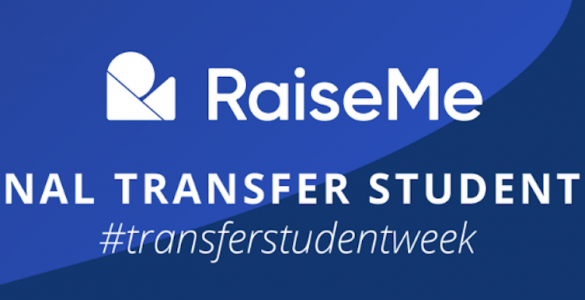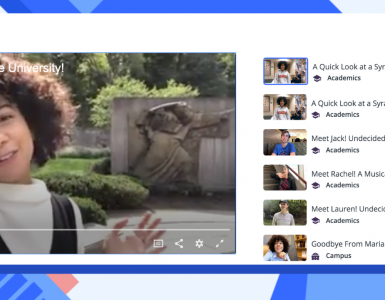RaiseMe Transfer Stories: Frank Castro Summerlin, District Partner Manager
Frank shares his own experience navigating the journey in transferring to a four-year institution from a community college. Read on below to learn more about his story.
This year, to honor National Transfer Student Week, we’re proud to highlight some transfer success stories from within our own community and even within our own team. To kick off the festivities, we’re excited to introduce Frank Castro Summerlin, a District Partner Manager at RaiseMe. Below, Frank shares his own experience navigating the journey in transferring to a four-year institution from a community college. Read on below to learn more about his story.
 Meet Frank Summerlin, District Partner Manager at RaiseMe.
Meet Frank Summerlin, District Partner Manager at RaiseMe.
Why was community college the right choice for you?
As four-year universities become more competitive — and expensive — the discussion around community college being a viable post-secondary option is growing, but I wouldn’t say it was a “choice” for me. Many community college students go there by default, myself included. I decided to take summer classes to graduate high school a year early after I was emancipated at 17. This meant I never had a senior year in high school to prepare college applications. Community college just seemed like a natural progression. I knew people who were there already, so I signed up for classes. Looking back though, I wouldn’t change anything. Community college was flexible. It allowed me to work full-time hours to support myself, my classes were interesting and small, and I built solid relationships with my professors. I also saved A TON of money on tuition. I am happy community college is becoming a bigger part of our conversations in higher education. It’s long overdue.
What was the most challenging thing about transferring?
Not having a material support structure or a place or person to turn to for sound academic guidance. There’s a statistic out there that says 80% of community college students intend to transfer to a four year institution while pursuing a bachelor’s degree — only 17% succeed. If that trend is consistent with other trends in the demography around higher education, I know those statistics drop off further for first-generation students of color like me. I feel exceptionally lucky to have figured it out. I know a lot of people want to tout individual “grit,” which really is just thinly veiled bootstrapping, as the reason I made it through community college, but I know for every one of me who made it through there are several others who were similar but who simply were not in the right place at the right time or were not connected to the right people.
What would you like educators to know about transfer students?
We are not a great mystery. I’ve said this before: At all levels, meeting students’ material needs is foundational to promoting community and self-actualization.
Any exercise in equity has to center this reality and allocate resources specifically for transfer initiatives. And yet we also have to remember that all transfer students are not the same. I think we sometimes see equity as a rubric where we can checkmark a list of boxes and then assume we’ve arrived at what all students need, but that will never be the case. Equity is a process, not a destination — so institutions need to have enough elasticity built into their processes to be able to ebb and flow with the very diverse sets of needs that transfer students bring.
Many students who today we call transfer or “non-traditional” students are students who, historically, have been denied access to the resources that provide the most basic building blocks for academic success.
How have you leveraged your four year degree professionally?
When I worked in college access I used to start my speaking engagements with a little thought exercise. I’ll do this with you now. If I were to drop you into the middle of a desert RIGHT NOW and you could only take what you can carry, what would you take with you? Most people would say their phone! But let’s imagine you’d lose signal. What else would you take? Water? Something for shelter? Now imagine, instead of dropping you into the middle of a desert I dropped you into the middle of downtown New York City. What would you need to survive there?
For me a college degree was a matter of survival. I needed this tool like a key that unlocks the door to a new, more livable level. I needed to know I had more runway in my life than what seemed possible back then. Since graduating I have found my degree has been like a passport into spaces I would not otherwise be allowed. It has certainly opened doors, but I also want to say it has been my community that has gotten me to where I am today. I would not have made it through college without the support of a lot of people. Now I use my degree to wedge open a few doors for those still working their way up the stairwell.
Since graduating I have found my degree has been like a passport into spaces I would not otherwise be allowed.
What advice would you give to transfer students?
Nobody makes it alone. Our ability to succeed or fail, both individually and as communities, is a reflection of what we choose to build with each other — and often of how we choose to build. When I worked directly with students I would always share a quote with them that my partner once shared with me by science fiction author Adrienne Maree Brown:
“Oak trees don’t set an intention to listen to each other better, or agree to hold tight to each other when the next storm comes. Under the earth, always, they reach for each other, they grow such that their roots are intertwined and create a system of strength that is as resilient on a sunny day as it is in a hurricane.”
– Adrienne Maree Brown
So my advice is to plug into a network of people who can support you. Make friends with the transfer center. Find the academic advisor who will go to bat for you. Locate the resources on and off campus that are going to help you survive through turbulent times. Be relentless about growing your community because when you falter there will be somebody to step up for you in the moments that you need to step back. And when you make strides in your life towards everything you wanted it to be, don’t forget to reach back and lift up the folks behind you.
You may also like

National Transfer Student Week 2020: Celebrate With RaiseMe!
Join RaiseMe in celebrating National Transfer Student Week October 19th-23rd. This is a week to celebrate our students, connect them with resources, and to...

Students — Earn Micro-scholarships For Taking Civic Action This Election
This fall, more than 80 colleges and universities on RaiseMe are offering micro-scholarships to community college and high school students for civic engagement...

NEW: Peer Into College Life With CampusReel Videos on RaiseMe
Now on RaiseMe, you can watch videos created by real students to get a true sense of college life and find out what schools are right for you.

